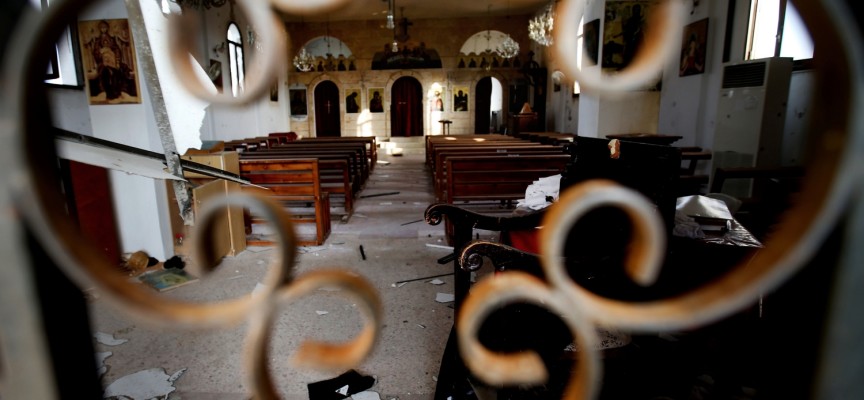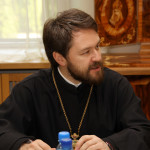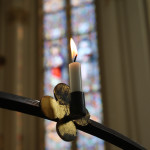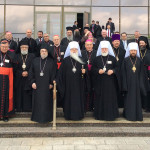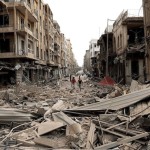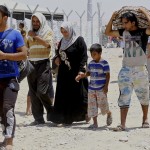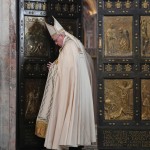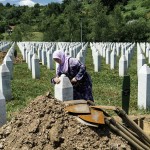The news of the brutal massacres by ISIS troops in Iraq against Christians, Yazidis, and Shiites have turned on a new debate on war and peace in the Christian Churches of Europe. Essentially, the question is whether it is morally permissible to help beleaguered nations or ethnic groups in other countries with the use of weapons and force.
Even from the Vatican in these days we hear rumours that seem to suggest a use of weapons to save the endangered minorities in Iraq. Archbishop Silvano Tomasi, a Vatican’s top diplomat at the United Nations, said that military action might be needed. Even the Pontifical Council for Interreligious Dialogue, which is always peace-oriented, issued one of the most acute condemnations of ISIS atrocities. Their text implicitly suggests the conclusion that a military intervention by the Western (and Islamic!) countries against the ISIS is no longer avoidable.
The Catholic bishops of Europe have addressed, with a historically unique and unusual action, the members of the Security Council of the United Nations (including the United States, China, Russia, Britain, and France), urging them to find “all possible and legitimate means” to stop this tragedy. Even in this text the use of soldiers and weapons is implicitly required. The presidents of the CCEE and Comece, along with the presidents of 31 European Catholic Bishops’ Conferences, have made reference to this appeal.
Indirectly or explicitly: never before since the Second World War so many authoritative voices in the Catholic Church in Europe have taken a stand in favour of using, as a last resort, even weapons to disarm an aggressor. The reason is the unprecedented behaviour of the ISIS troops which are killing masses of unarmed civilians and trample both human rights and the international humanitarian agreements on the war code of conduct.
Meanwhile in the EKD (“Evangelical Church of Germany”), the largest Protestant church in Europe, there is a lively discussion on the legitimacy of armed intervention. While former EKD President Margot Käßmann clearly expressed her opinion in favour of a peaceful process in an interview, the Protestant Bishop of Bavaria, Heinrich Bedford-Strohm, commented that he is “relieved” by the American air strikes to protect civilians who are seriously threatened in Iraq.
A less clear position has been taken by the EKD President currently in office, Nikolaus Schneider. He sternly condemned violence in Northern Iraq and spoke of heinous crimes “against all ethnic and religious groups”. At the same time, Schneider has encouraged politicians in Germany and Europe to engage with “every means of diplomacy” for the protection of the civilian population in Northern Iraq.
Die Berichte über brutale Massaker der ISIS-Truppen im Irak an Christen, Yesiden und Schiiten haben in den christlichen Kirchen in Europa eine neue Debatte über Krieg und Frieden entfacht. Im Kern geht es darum, ob es moralisch erlaubt ist, bedrängten Völkern oder Volksgruppen in anderen Ländern mit Einsatz von Waffen und militärischer Gewalt zu helfen.
Selbst aus dem Vatikan kommen in diesen Tagen Stimmen, die einen bewaffneten Einsatz zur Rettung der bedrohten Minderheiten im Irak nahelegen. Erzbischof Silvano Tomasi, vatikanischer Spitzendiplomat bei der UN, sprach davon, dass eine Militäraktion notwendig sein könnte. Und der sonst stets sehr friedlich gesinnte Päpstliche Rat für den Interreligiösen Dialog veröffentlichte eine der schärfsten Verurteilungen der Gräueltaten der IS. Der Text legte in der Konsequenz unausgesprochen die Schlussfolgerung nahe, dass ein militärisches Eingreifen aus dem Westen (und aus islamischen Staaten!) gegen die ISIS nun nicht mehr zu vermeiden ist.
Dann haben sich die katholischen Bischöfe Europas in einer ungewöhnlichen, historisch einmaligen Aktion an die Mitglieder des UN-Sicherheitsrates (unter anderem die USA, China, Russland, Großbritannien und Frankreich) gewandt und sie aufgefordert „alle möglichen und legitimen Mittel“ zu ergreifen, um diese Tragödie zu stoppen. Auch in diesem Text wird implizit der Einsatz von Soldaten und Waffen gefordert. Dem Appell haben sich die Vorsitzenden der Dachverbände CCEE und Comece angeschlossen, ferner die Vorsitzenden von 31 nationalen Bischofskonferenzen in Europa.
Ob indirekt oder explizit: Noch nie seit dem Zweiten Weltkrieg haben sich so viele maßgebliche Stimmen in der katholische Kirche in Europa dafür ausgesprochen, als „ultima ratio“ auch kriegerische Mittel einzusetzen, um einen Aggressor zu entwaffnen. Grund ist das beispiellose Vorgehen der ISIS-Truppen, die massenhaft unbewaffnete Zivilisten töten und die Menschenrechte ebenso mit Füßen treten wie internationale humanitäre Vereinbarungen über die Kriegsführung.
In der EKD („Evangelische Kirche in Deutschland“), der größten protestantischen Kirche Europas, wird unterdessen heftig über die Erlaubtheit bewaffneter Interventionen gestritten. Während die frühere EKD-Vorsitzende Margot Käßmann sich in einem Interview klar für einen pazifistischen Weg aussprach, kommentierte der evangelische Landesbischof in Bayern, Heinrich Bedford-Strohm, er sei „erleichtert“ über die amerikanischen Luftangriffe zum Schutz akut bedrohter Zivilisten im Irak. Eine weniger deutliche Position nahm der amtierende EKD-Vorsitzende Nikolaus Schneider ein. Er verurteilt die Gewalt im Nordirak „aufs Schärfste“ und sprach von abscheulichen Verbrechen an ganzen ethnischen und religiösen Gruppen“. Zugleich ermutigte Schneider die Politiker in Deutschland und Europa, sich mit „allen Mitteln der Diplomatie“ für den Schutz der Zivilbevölkerung im Nordirak einzusetzen.
Fermate i massacratori in Iraq
Le notizie dei brutali massacri delle truppe ISIS in Iraq contro cristiani, yazidi e sciiti hanno acceso nelle Chiese cristiane d’Europa un nuovo dibattito su guerra e pace. In sostanza, ci si chiede se sia moralmente lecito aiutare nazioni assediate o gruppi etnici in altri Paesi con l’uso delle armi e della forza.
Anche dal Vaticano in questi giorni arrivano voci che sembrano suggerire un uso delle armi per salvare le minoranze in pericolo in Iraq. L’arcivescovo Silvano Tomasi, alto diplomatico del Vaticano presso le Nazioni Unite, ha detto che un’azione militare potrebbe essere necessaria. E il Pontificio consiglio per il dialogo interreligioso, normalmente sempre predisposto alla pace, ha pubblicato una delle condanne più acute delle atrocità della ISIS. Il testo di conseguenza suggerisce implicitamente la conclusione che un intervento militare da parte dell’Occidente (e dei paesi islamici!) contro la ISIS non sia più evitabile.
I vescovi cattolici d’Europa si sono poi rivolti, con un’azione storicamente unica e insolita, ai membri del Consiglio di sicurezza delle Nazioni Unite (tra cui Stati Uniti, Cina, Russia, Gran Bretagna e Francia), esortandoli a trovare “tutti i possibili e legittimi mezzi” per fermare questa tragedia. Anche in questo testo viene richiesto in modo implicito l’uso di soldati e di armi. A questo appello si sono collegati i presidenti di CCEE (Consiglio delle Conferenze episcopali d’Europa) e COMECE (Commissione delle Conferenze episcopali della Comunità europea) e inoltre i presidenti di 31 Conferenze episcopali europee.
Indirettamente o esplicitamente: mai prima d’ora dalla seconda guerra mondiale così tante voci autorevoli nella Chiesa cattolica in Europa si sono espresse per utilizzare, in ultima istanza, anche mezzi bellici per disarmare un aggressore. La ragione è l’azione senza precedenti da parte delle truppe ISIS che uccidono masse di civili inermi e calpestano sia i diritti umani sia gli accordi umanitari internazionali sulla conduzione della guerra.
Nella EKD (“Chiesa evangelica di Germania”), la più grande Chiesa protestante in Europa, nel frattempo, si discute intensamente sulla legittimità di un intervento armato. Mentre l’ex presidente EKD Margot Käßmann si è chiaramente espressa in un’intervista per una via pacifica, il vescovo protestante di Baviera, Heinrich Bedford-Strohm, ha commentato che è “sollevato” dagli attacchi aerei americani a difesa dei civili gravemente minacciati in Iraq.
Una posizione meno chiara ha preso il presidente in carica dell’EKD, Nikolaus Schneider. Ha condannato le violenze nel Nord dell’Iraq in modo molto severo e ha parlato di crimini efferati “verso tutti i gruppi etnici e religiosi”. Allo stesso tempo, Schneider ha incoraggiato i politici in Germania e in Europa a impegnarsi con “ogni mezzo della diplomazia” per la protezione della popolazione civile nel Nord dell’Iraq.
Ludwig Ring-Eifel
Chefredakteur, Kna (Deutschland)
Latest posts by Ludwig Ring-Eifel (see all)
- What will be Pope Francis’ message? - 14 ottobre 2014
- Stop the slaughterers in Iraq - 16 agosto 2014
- The Strasbourg Burqa judgment - 10 luglio 2014

